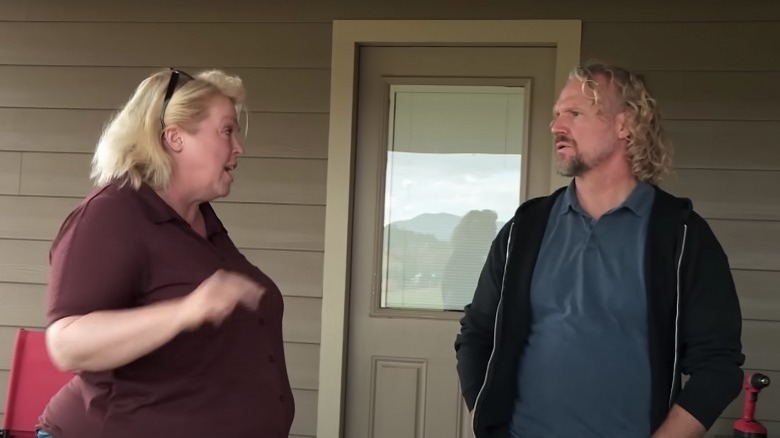How The Sister Wives Cast Got Into Legal Trouble Over Their Many Marriages
The Brown family has been entertaining fans for well over a decade thanks to the TLC hit "Sister Wives." The show follows husband and father Kody Brown and the journey he took with four wives: Meri, Christine, Janelle, and Robyn, per People. Thanks to his plural marriage, Kody is father to 18 children. "Sister Wives" debuted in 2010 to some shock and criticism over the family's polygamous lifestyle, but has since become somewhat more accepted. Season 17 wrapped in December, so they're obviously doing something right.
While things are working for viewers, the Brown family's plural marriage doesn't seem to be lasting. Christine split from Kody in November 2021, and Kody claimed Christine was playing games with him. Then, in December, Janelle jumped ship and split with Kody, too. Literally days later, Meri and Kody announced they were separating. By default, it looks like Kody might be in a monogamous marriage after all, with wife Robyn. But before all of the separations, the family faced ongoing legal trouble because of their plural marriage and it caused a lot of stress and several relocations.
Kody Brown challenged Utah's polygamy laws
The Brown family made polygamy work by having only one legal marriage at a time. For instance, Kody and Meri Brown were legally married and decided to divorce in 2014 solely so Kody could marry Robyn and legally adopt her children from an earlier relationship, per Distractify. All of his other relationships — with wives Meri, Janelle, and Christine — were considered spiritual marriages. While this worked for the Brown family, they came under legal scrutiny the day after their TLC show "Sister Wives" premiered in 2010. They were situated in Lehi, Utah, and police began investigating them immediately, In Touch noted. Polygamy was considered a third-degree felony in Utah, KSL News stated. It's worth mentioning, too, that while Kody was only legally married to one woman, the state of Utah considered cohabitation a form of marriage.
Polygamy was outlawed in Utah so, in 2011, Kody challenged the criminalization of polygamy in Brown v. Buhman. "We only wish to live our private lives according to our beliefs," Kody said in a statement, per In Touch. "While we understand that this may be a long struggle in court, it has already been a long struggle for my family and other plural families to end the stereotypes and unfair treatment given consensual polygamy." The Browns saw success in 2013, per The New York Times, as part of the polygamy law was struck down in Utah.
Slow change for the Brown family
Despite this legal victory, the Brown family faced several hurdles because of their plural marriage. They decided to move from Utah in 2010 to Las Vegas. "I can't have my family live in fear," Kody said in an episode of "Sister Wives" (via Distractify). "Every day that we're here, our family goes deeper and deeper into the fear of what can happen." There were legal ups and downs in their journey for plural marriage equality. In 2016, the court struck down the Brown's previous ruling, claiming that they faced no real threat of prosecution and therefore "had no right to sue," a publication by The Salt Lake Tribune said, and made polygamy a third-degree felony once again. In 2017, the Supreme Court refused to hear the Brown's case, according to The Salt Lake Tribune, therefore upholding the lower court's decision to keep polygamy as a felony.
The family moved to Flagstaff, Arizona in 2018, but they also faced legal repercussions there. Attorney Dwane Cates told Radar Online that said lifestyle counted as a Class 5 felony. "He could get half a year to two-and-a-half years," Cates said of Kody. "He could get probation up to three years and $150,000 in fines." However, things changed in Utah. In 2020, a law decriminalized plural marriage, per CNN; it's no longer a felony, but an infraction. In a confessional on "Sister Wives," Janelle Brown said (via People): "We're like, no longer felons for living our religion."



